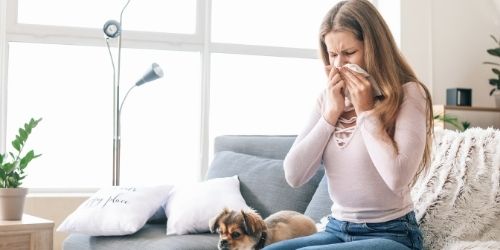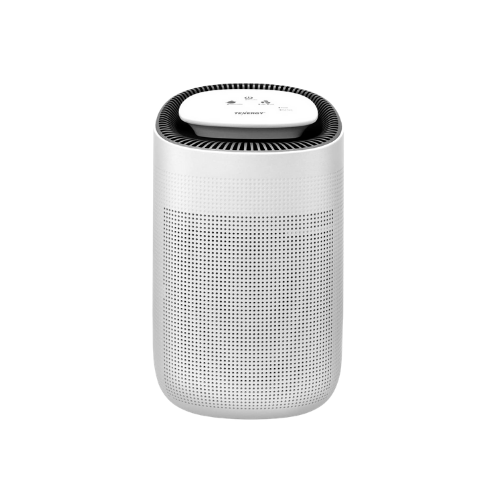Does a dehumidifier help with allergies
3 Key Takeaways:
🚀 A dehumidifier can help with allergies and asthma by keeping allergy symptoms at bay in your house.
🚀 Keeping the relative humidity of your home in check will serve as one of the many ways for allergy relief.
🚀 Experts suggest that the ideal relative humidity level could be maintained with the help of dehumidifiers or humidifiers.
There are different reasons that could lead to an allergy; air pollution, dust mites and mold, mildew, sudden exposure to a strong smell, underlying sinus problems, etc. When left untreated, allergies and asthma are highly capable of becoming serious health issues. Among the various methods that can be taken to control allergens in indoor air, purchasing a dehumidifier with true HEPA filter is a wise choice.
If you were to ask if, ‘Does A dehumidifier help with allergies and asthma?’, the answer is ‘YES! A dehumidifier can help’. You can keep allergy symptoms at bay in your house by investing in the right dehumidifiers.
Keeping the relative humidity of your home in check will serve as one of the many ways for allergy relief. Fresh and dry air gives very few opportunities for some common allergens. For example; bacteria, dust mites, mold spores and mold growth, etc. Each of the above triggers an allergy in its own way. Getting rid of these allergens and improving the quality of indoor air would reduce allergies to a large extent. Air filters within dehumidifiers help to purify the air, remove the excess water vapor and moisture from the air and send out dry air in return. This filtration process from a dehumidifier can help to keep the air fresh in your house throughout every season.
Is humidity Good Or Bad for allergies?
The humidity level in the atmosphere around you should be ideally maintained at a level that is comfortable to stay in. When the season or climatic condition does not support that, we seek the help of appliances. The increased humidity level can be difficult to adjust, hence we turn towards air conditioning and dehumidification. What we often do not connect with the high humidity level is the health hazards that it brings in different areas of your home, other than causing damage to property. Therefore, high humidity or low humidity; either is bad for allergies. Let us know-how.
When the air is filled with moisture, laden with water droplets, making it heavy, it becomes an excellent breeding ground for different molds, dust mites, bacteria, mildew, and other allergens. When there is a shooting rate of mold growth and other allergens having a causal dwelling in the air that is circulating within any home, there is a good chance of people coming in contact with that air will develop allergy symptoms. If there is any history of preexisting asthma or other respiratory problems, they might also magnify. Allergy symptoms due to high humidity levels will include sneezing, coughing, itchy or watery eyes, wheezing, irritation in the nose and nasal passage, etc. One of the common areas in a home where one might contract allergies from mold growth is the basements. The least visited basement and crawl spaces are famous breeding grounds for mold and other allergens.
You might be surprised to learn that low humidity levels also have their share of cons. In areas of low humidity, the water vapor content in the air is at a minimum. This condition triggers skin allergies like dry and flaky skin, due to the moisture from the skin being stripped out, drying in the nose and nasal passage, and sinus. Most people find the need to be constantly hydrated and moisturize their skin often when the humidity level is at its lowest in the room. This is where humidifiers are essential. With the help of a humidifier, you can add moisture to the environment you are in. There are cool mist humidifiers and warm mist humidifiers. You can choose the humidifier that best suits your home and its existing moisture or humidity level. Both types of humidifiers are equally good in performance and function. You can purchase the one that appeals to your personal preference.
To prevent allergies that arise from both high and low humidity, experts suggest that the ideal relative humidity level could be maintained with the help of dehumidifiers or humidifiers. With the various advancements in technology, you can now purchase a large or small size dehumidifier based on the requirement of your home if moisture removal is your concern. If low humidity and moisture addition is essential invest in the right humidifier.
Does a dehumidifier help with congestion?
Although technically dehumidifiers cannot heal or provide relief from congestion, they can help in many ways to keep allergies at bay. Since the device can control humidity, it has many benefits when it comes to keeping congestion away. When the excess moisture is removed from the air, the thriving allergens are also gone along with it. Hence, indirectly dehumidifiers certainly have their benefits and importance in keeping congestion away.
4 Ways to reduce allergy issues at home

If persistent allergies are an issue at home and you want to put an end to them, there are a few things the experts suggest that you practice. Here are the four best ways to minimize allergy triggers in any room.
1. A Clean Home: Nothing beats fresh linen. Make it a regular practice to carry out deep cleaning. Keeping dust off the surfaces that you come in contact with often is necessary if you are prone to allergies. These will include changing pillow covers, bedspreads, cushions, curtains, towels, and other fabrics on a regular basis. To be doubly sure that they are completely dust-free, you can wash them on the pre-wash cycle and sundry them to kill the microscopic allergens. Deep clean every corner of your home. Limit the things exposed to reduce dust build-up. Keep your home smelling fresh and pleasant. Essential oils are a great mood booster and there are certain oils that are meant to help with allergy symptoms. Leave no space for the musty smell. Set aside time and schedule to vacuum your home thoroughly as often as needed. Identify what are the possible items within the house that lead to allergies and eliminate them.
2. Take Help: Hire some expertise to prevent mold and mildew from building up in your crawl spaces, basements, and other damp areas of your home. Make sure your HVAC system, A C, dehumidifiers, air purifiers, etc., are all clean and intact. Each of these appliances will have filters in them. Keeping the filters free from dust mite and pollen will prevent clogging. You can be assured that you are breathing in air that is clean and free from allergens. Mark your calendar to stick to one day meant for cleaning the filters and hiring an assistant for home removal and stick to this.
3. Dehumidifiers: Mold and mildew are notorious allergens and they thrive in humid conditions. Purchase the dehumidifier that will keep your house guarded against mold damage.
4. Humidifiers: Many receive medical advice from their physician to check if their home requires a humidifier. We often miss realizing that dry air can also be the cause of allergy symptoms, asthma, and other related problems. If some additional humidity is what a house needs, make sure it gets it. Humidifiers can also help with relieving congestion, chest cold, etc. If medical advice recommends this, put some action into purchasing a suitable humidifier.
How dehumidifiers can help if you are allergic to dust mites?
Dust mites are a common concern in high humid conditions. One of the many features that make dehumidifiers popular is their air purifiers. The filters that dehumidifiers come with are capable of trapping in small allergens that are invisible to the naked eye. The filters do require to be cleaned regularly to prevent clogging.
Can dehumidifiers control Pet Allergies?

Yes, they can. Almost all models of dehumidifiers are equipped to trap allergens, pollutants, and pet dander in their filters. They can purify the air and make it pollution-free. If pet dander is the reason for your allergic symptoms, a dehumidifier can most certainly resolve the issue for you.
Which is the best dehumidifier in reducing allergies at home?
If you are on the lookout for the best house dehumidifier, you can look into Tenergy Sorbi 1000ml Air Dehumidifier. This portable dehumidifier uses Peltier technology and HEPA filtration to improve the quality of the air that you breathe in. It is a silent small dehumidifier, that has 35-42db for its noise level and can cover an area of up to 200 square feet. Its small size makes it easy to be taken into any room in need of moisture removal. The 1-liter water tank can absorb 750 ml per day when it is working in environments with 80% humidity and 86º Fahrenheit.
Other features and benefits of this small room dehumidifier are LED indicator, auto-shutoff, water level sensor, simple plug design, energy efficiency, ETL, and CARB certified for safety and quality. Moreover, the company offers a 2 year extended warranty on registering your unit with Tenergy Life. If your concern is to keep away allergy symptoms and asthma along with excess water removal from the air, you should try Tenergy Sorbi Air Dehumidifier to control humidity in every room in your house.
Wrapping Up
With this, we have reached the end of our blog post on the relationship between dehumidifiers and allergies. Hope you are convinced that dehumidifiers can certainly help to prevent and reduce your allergic symptoms and reactions against the most common allergens that you find at home. Let us know which dehumidifier works best for you and how do they help you to maintain humidity in your environment.

About The Author
Olivia — a self-confessed air quality addict — is a home climate enthusiast, fresh air advocate, and someone with deep personal experience and knowledge about mold extermination. Her work was mentioned in countless notable humidity publications. Previously she was an editor at Mold Remediation.
